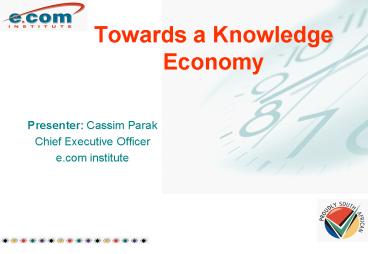Towards a Knowledge Economy - PowerPoint PPT Presentation
1 / 17
Title: Towards a Knowledge Economy
1
Towards a Knowledge Economy
- Presenter Cassim Parak
- Chief Executive Officer
- e.com institute
2
A South African Perspective Trends Performance
- Approximately 50m Population
- 22m Mobile Phones
- 7m Computers
- 4m Internet Users
- 35 ICT adoption by Small Businesses
- Business Country Demographics imbalance
- Apartheid legacy not completely eradicated
- No Financial Support
3
A South African Perspective Trends Performance
- Telecommunication Costs
- IT Acquisition Costs
- Computer Literacy
- Regulating the Informal sector
- Failure of the Private Sector to embrace BEE
Suppliers of ICT products - Poor financial resources
- Compliancy
- Availability of Skills Brain Drain
4
A South African Perspective Trends Performance
5
Is this Knowledge Management?
6
This is Knowledge Management
HTML
WAP GPRS
PDA
SMS
Collaboration
Voice
Internet
Employees
Partners
Procurement
Agents
7
The Knowledge Economy
- One of the hallmarks of the information age is
that the new currency of business is information
or knowledge collaboration. The way in which that
knowledge is managed and used can ultimately
determine the success or failure of any
enterprise.
8
The Connected Enterprise
Enterprise Solutions
Business Intelligence
Suppliers
Business to Business
Clients
The Business
Business to Consumer
Local Competitors
Employees
Landscape
Global Competitors
Decision Support
Business to Employee
Management
New Entrants
Knowledge Management
Performance Management
9
Building Blocks for Knowledge-centricity
- Usability I am simple in my approach..
- Wizard - Help! I need Help Now!
- Intelligent Repository - Tracking it All, Knowing
it All.. - Business Intelligence Single version of the
truth.. - Management Information Systems My Decision
is.. - Enterprise Performance Management Lets Grow.
- Content Management Where do I find..
- Document Management I did it previously
- Business Process Management How do I
- Workflow This is how I/We/Us Work..
- Collaboration This is the team..
10
Generic Components for Business Management
CRM Customer Relationship Management MCS
Marketing Communication Systems SMS Sales
Management Systems ERP Enterprise Resource
Planning ERM Enterprise Resource Management EPM
Enterprise Project Management MPS
Manufacturing Planning Systems SCM Supply Chain
Management WMS - Workflow Management Systems MRO
Maintenance Repair Ordering PPS Production
Planning Systems EBPP Electronic Bill
Presentment Payment HRMS Human Resource
Management Systems AM Asset Management
11
Critical Considerations
- COMMITMENT
- Security
- Infrastructure
- Enterprise Applications Integration
- People Learning
- Connectivity
- Collaboration
- Storage
- Disaster Protection
12
Component Alignment CSF for eBusiness Management
13
KM for the Business Enterprise
Structured
Unstructured
14
Intelligence in the Knowledge Economy
15
ICT 4 (S)ME Pushing Forward
- Establishing a robust ICT Industry Strategy for
SME Development - Promoting the business benefits of ICT to the SME
sector - Penetration strategies for ICT-use within the SME
sector - Removing the Connectivity constraints as a
barrier to entry - Promoting the use of locally developed
technologies - Alliances Diversity of Partnerships
- Ensuring an effective Government sponsored
framework for Legislation, Regulation, Taxation
subsidies - Driving Computer Literacy through Education
Training Programs (Sector Education Transfer
Programs) - Establishing a case for Donor grants and subsidies
16
A Model ICT-SME ECO-SYSTEM
17
Lou Gerstners Description of eBusiness
(ex-Chairman IBM)
- The Internet is ultimately about innovation and
integration. Innovation is what your objective is
-- in cost structures, selling, marketing, sales,
supply chain. But you don't get the innovation
unless you integrate Web technology into the
processes by which you run your business. And
that's been the rude awakening for a lot of
companies. The true revolution coming from the
Web is when the Web can get integrated with
business processes.































